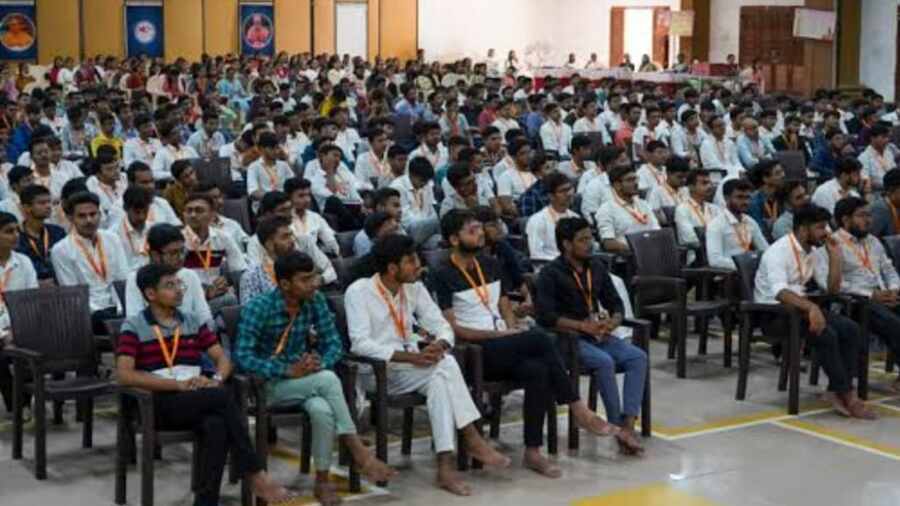In the realm of Wellness Observation Week, the Healthy Minds Foundation organized a speaker series for youth. Today’s deliberation on Feelings brought valuable insights from Ms. Chinnmaye Praveen, an entrepreneur by profession, a social activist by passion, and a freelance counselor who has helped people become community fit and provided strong support for various complications and difficulties.
Firstly, when asked about feelings, she stated that feelings are the fulcrum of living; they create something, sometimes everything, from nothing. Humans have a very strong mind and body connection through feelings; everything a person does is to gain more of a feeling or to move away from a feeling. Every feeling has the potential to elevate or demote one’s life.
Delving a little deeper, she addressed the question, “Can emotions and feelings in the mind influence physical well-being?” She answered affirmatively, saying, “Definitely yes. It’s always a two-way relationship where the mind influences the body and the body influences the mind. Just observe—if your body is chaotic, your mind behaves chaotically, and vice versa. Many may have noticed that by bringing the body to equilibrium, the mind starts calming by itself. So, whether the body controls the mind or the mind controls the body is still debatable. I leave it to personal perspective.”

When asked to share insights on navigating a good feeling mode, Chinnmaye emphasized the importance of self-talk. She explained that negative thinking patterns and self-criticism impact our ability to cope with internal triggers, affect our action-taking capability, and lead to a loss of self-control. For example, she quoted a patient diagnosed with pre-diabetes who, despite being told by the doctor that it is reversible through diet and exercise, believes that he cannot prevent it because everyone in his family has diabetes. This negative inner voice pattern makes his case more likely to prevail with diabetes.
Secondly, she claimed that emotions and feelings prepare us for our behavior and habits formation. Feelings and thoughts are the cornerstones of who we are. She gently demonstrated how making someone a priority strengthens attachment through shared feelings and emotions. If, for any reason, you are not their priority, self-imposed expectations and self-derived commitments start getting suppressed, resisting temptations, and declining your demands. This whole process can be mentally taxing. If the cycle continues for unexplained reasons and justifications, the identity you once had as cheerful, upbeat, and vigorous may swap to nasty, sluggish, and diffident. Unknowingly, you start behaving according to the tags of the person you prioritize.
She strongly advised that one word which may serve as a rule of practice is RECIPROCITY. Don’t hesitate to demand to be filled in the same way you pour, whether it’s time, energy, or effort. Negotiate the doable commitments with adjustments, which may save you from transitioning from a strongly coupled relationship to a loosely coupled one.
In the final conversation, Mrs. Praveen spoke about creating good feelings. She advised to “grow through what you go through.” Start focusing on small and simple things like listening to a song that makes you feel joyful. Make a habit of talking often to a person who makes you feel heard, valued, and respected. Read a few lines that align with your values. To feel good, it is not always necessary to plan luxury vacations or dine in star-rated restaurants; sometimes, the same feel-good feeling can be felt by simply thinking of the good people we are blessed with.
When asked for tips on managing times when we feel low for no reason, she enthusiastically suggested taking a few minutes to look through past experiences that were once considered impossible, exchanging texts with loved ones, remembering a chat that triggered your enthusiasm, a call that boosted your energy, or a drive you had with meaningful conversation. These actions create sensational stimuli, and you start noticing a happier you. The energy you release becomes your vibration.
Her final statement was: “Small daily investments in your good feelings pay off with big rewards in designing your life. Your capacity to override unwanted feelings, emotions, and impulses can help you envision a bigger picture of your life. Design your life; don’t live in default mode.”
Inputs Recorded by
Mr. Swarup Gupta
Community Head, Healthy Minds
For any concerns on mental wellness connect



